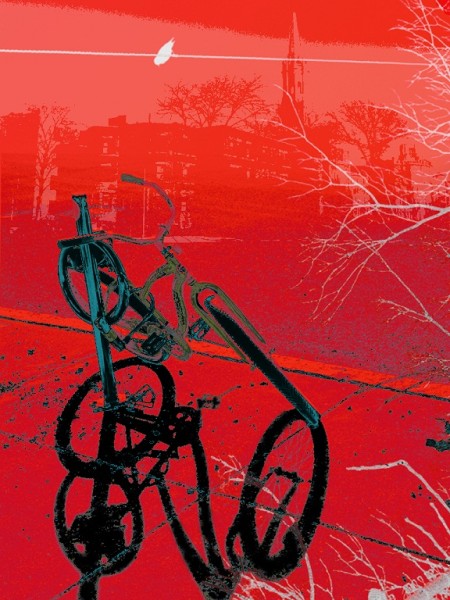What do you do when your son kills his father, then himself? Your son, a nineteen-year-old sweetheart who’d found a way to cope with this communist country, who’d left school to help his father, a butcher, make sure you had enough to make ends meet. A slender boy whose dream of leaving the country oozed an enviable ambition—something your people’s youth had lost—causing pride to swell in your heart, the same kind of pride, you knew, some mothers secretly feel when their sons boast about going off to war.
A handsome boy you thought had never and would never hurt anybody, not on purpose. A charming creature whose eyes looked at you differently, who confided in you without your asking. Your one and only son, the reason you could bear the interminable poverty, and the oppressive heat, and the rotten garbage smell on your way to the bodega, and your husband’s four-month imprisonment for selling meat under the counter. Your beloved son. A bicycle thief, and a murderer.
You find out he hid behind a lamppost during a blackout—you imagine, listening to the wind slap against the wheel spokes of a bicycle, watching a silhouette rush down the dark hill—and jumped out swinging a metal pipe like he would a baseball bat when he was twelve, tumbling a man, a stranger to him, off his bike. The man’s head smacked against the edge of the sidewalk, his lifeless body left behind by your son, already on the stolen bike following a planned route toward home. He came in the house through the back door, concealing the bike in his room to sell the parts to so-called friends who later confessed it wasn’t the first time your son had taken one.
You cursed at them, your love for him unshaken, because what else could he do in a place where honesty left you with nothing?
What do you do when the police inform you that your husband was killed, his head smashed in, his bicycle—a prized commodity in your country, his main mode of transportation—stolen? You tell your son about his father, and a sudden panic grips his face. He locks himself in his room. You knock and plead, but he won’t answer. So you give him his space, though you need him more than ever.
Then you find him the next morning, this tender extension of yourself, la luz de tus ojos, hanging from the cheap ceiling lamp your husband bolted too well years ago, ripped bed sheets wrapped tightly around his neck, his cheeks purple, his mouth open like a thirsty dog’s. You see the bicycle—that damn green Chinese bicycle you never dared to ride despite your husband’s insistence—and not even the shock keeps you from understanding what happened, from detecting the cruel irony, from knowing that their absence will be unbearable, that the silence in your house will drive you mad.
You see his note, “Please forgive me. I deserve the worst,” and it disables your body and smothers your wails, and it feels like you’re drowning. You drop to the floor and crumple the piece of notebook paper and shove it deep in your mouth, hoping it will get lodged in your throat and suffocate you.
Your parents’ way of alleviating your grief is asking you to move in with them. They tell you they need someone around the house, that it will keep you busy, that you should leave your house to your sister, whose husband and three daughters are crammed in a one-bedroom apartment too far from the rest of the family.
Your neighbors tell you it wasn’t your fault, that some of them have almost lost their children: a three-year-old who suffered from meningococcal disease, a twenty-one-year-old stabbed at a discoteca. No one tells you about dead sons or husbands. Instead they tell you to light candles, as if the ritual will give your life some meaning, as if the act will assuage your pain.
A babalao your friend recommended—a tall, sinewy man dressed in white who looks older than you suspect he is, whose house smells of tobacco and eggs—reads cowrie shells and advises you to move on. He tells you that your son’s spirit wants you to let go, that your husband’s spirit might be around for a while because there’s resentment in him. “Keep away from that desgraciao,” the babalao says, and you know he means it. “He doesn’t want you to have another man.”
What do you do when cursing and denouncing God won’t help because you don’t believe in God? How do you go to the meat-shop, hang your laundry on the clotheslines, scour the rice for weevils, look at another man, when all you see is a reminder that everyone is scrounging and stealing just to get by? How do you watch the bicycles hustling by on avenues, the neighborhood kids playing baseball with broomsticks? What do you do when suicide is not in you? When all you have left, all you can and will do, is to grow old?



 The core workshop of SmokeLong Fitness is all in writing, so you can take part from anywhere at anytime. We are excited about creating a supportive, consistent and structured environment for flash writers to work on their craft in a community. We are thrilled and proud to say that our workshop participants have won, placed, or been listed in every major flash competition. Community works.
The core workshop of SmokeLong Fitness is all in writing, so you can take part from anywhere at anytime. We are excited about creating a supportive, consistent and structured environment for flash writers to work on their craft in a community. We are thrilled and proud to say that our workshop participants have won, placed, or been listed in every major flash competition. Community works.